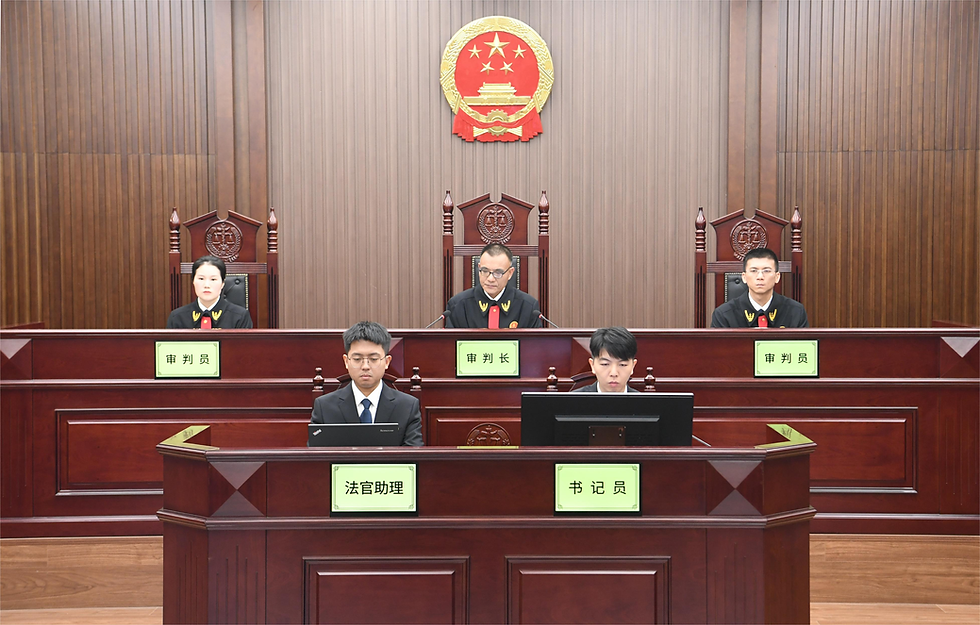How do I file a lawsuit in China?
- Allen

- Mar 30, 2025
- 4 min read
As a Chinese lawyer well - versed in international trade and cross - border litigation, I know that the prospect of filing a lawsuit in China can seem daunting, especially for foreign parties. However, with a clear understanding of the process and proper guidance, you can navigate it effectively. Here's a comprehensive guide for foreign plaintiffs who need to file a lawsuit in China.

1. Determine Jurisdiction
Contract - based Jurisdiction
If your case is related to a contract, start by examining the contract terms. Many contracts contain a jurisdiction clause that designates which Chinese court will handle disputes. For example, it might state that “any disputes arising from this contract shall be under the jurisdiction of the [specific court name] in [specific location].” If such a clause exists, and it is valid under Chinese law, you must file your lawsuit in the specified court.
General Jurisdiction Principles
In the absence of a jurisdiction clause, Chinese law follows general jurisdiction principles. For disputes involving a Chinese defendant, the lawsuit is typically filed in the court where the defendant is domiciled. If the defendant is a company, its domicile is usually considered to be the place of its registered business address. In cases of contract disputes, the court where the contract was performed or the place where the contract was signed may also have jurisdiction under certain circumstances.
2. Understand the Applicable Law
Choice - of - Law Clauses
Similar to jurisdiction, contracts often include a choice - of - law clause. This clause determines which country's laws will govern the contract and the subsequent dispute. If the contract specifies Chinese law, it simplifies the process as you will be applying well - established Chinese legal principles. Chinese lawyers are highly familiar with these laws, such as relevant provisions in the Civil Code regarding contracts, torts, and property rights.
Absence of Choice - of - Law
When there is no choice - of - law clause, Chinese courts will apply conflict - of - laws rules to determine the applicable law. These rules take into account various factors, such as the closest connection to the contract, the nationality of the parties, and the place of performance.
3. Prepare the Lawsuit Documents
Complaint
The complaint is the core document of your lawsuit. It should clearly state the plaintiff's and defendant's basic information, including names, addresses, and contact details. Describe the facts of the case in detail, including the events that led to the dispute, the nature of the claim (e.g., breach of contract, product liability), and the amount of compensation or relief sought. Support your claims with legal grounds, referring to relevant laws and regulations.
Evidence
Gather and organize all relevant evidence. This may include contracts, invoices, correspondence (emails, letters), witness statements, expert reports, and any other documents that can prove your case. In China, evidence must be presented in a proper format. For example, foreign - language documents usually need to be translated into Chinese by a qualified translation agency, and original documents are generally preferred over copies, unless otherwise specified by law.
4. File the Lawsuit
Submission to the Court
Take the prepared complaint and evidence to the court with jurisdiction. In most cases, you can file the lawsuit in person or through your legal representative. Some courts also offer online filing options, but the specific procedures may vary by region. When filing, the court will review your documents for completeness and compliance with legal requirements. If there are any deficiencies, the court will usually notify you to correct them within a specified time.
Payment of Litigation Fees
Along with filing the lawsuit, you need to pay the required litigation fees. The amount of the fees depends on the nature and value of your claim. Litigation fees are calculated based on specific regulations, and in some cases, if you win the lawsuit, the court may order the defendant to reimburse you for these fees.
5. Proceedings and Follow - up
Service of Process
Once the lawsuit is filed, the court will serve the legal documents, including the complaint, on the defendant. The service method may vary, such as direct service, service by mail, or service through public announcement in some cases where the defendant's whereabouts are unknown. The defendant will be given a certain period to respond to the lawsuit, usually within 15 days for a written reply.
Court Hearings
After the defendant responds, the court will schedule hearings. During the hearings, both parties present their cases, including presenting evidence, cross - examining witnesses, and making legal arguments. Chinese court hearings follow specific procedures, and it is important to abide by the court's instructions. Your lawyer can play a crucial role in representing you, presenting your case effectively, and ensuring that your rights are protected throughout the process.
Judgment and Enforcement
After the hearings, the court will issue a judgment based on the evidence and legal arguments presented. If you win the lawsuit and the defendant fails to comply with the judgment within the specified time, you can apply to the court for enforcement. The court has various enforcement measures at its disposal, such as freezing the defendant's bank accounts, seizing and selling its assets, to ensure that you receive the compensation or relief awarded by the judgment.
Filing a lawsuit in China involves multiple steps and requires a good understanding of Chinese laws and legal procedures. If you are considering filing a lawsuit in China or are already in the process and need professional assistance, our team of experienced Chinese lawyers is here to help. We have extensive experience in handling cross - border litigation cases and can provide you with comprehensive legal services, from case assessment and document preparation to representing you in court and enforcement procedures. Contact us today to schedule a consultation and let us guide you through this complex process.



Comments